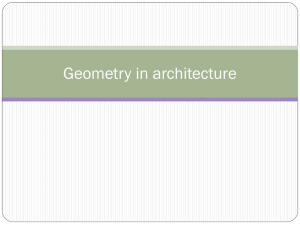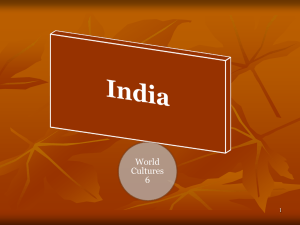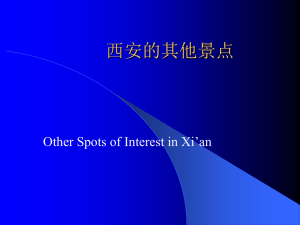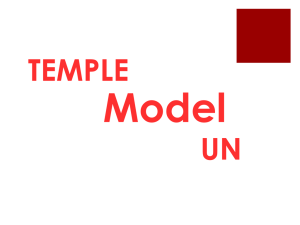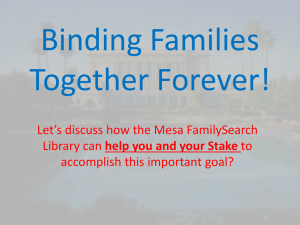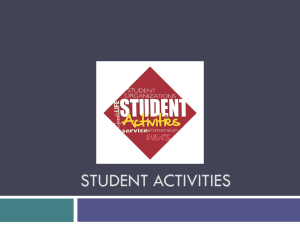Institutional Advancement, Kate Moore
advertisement
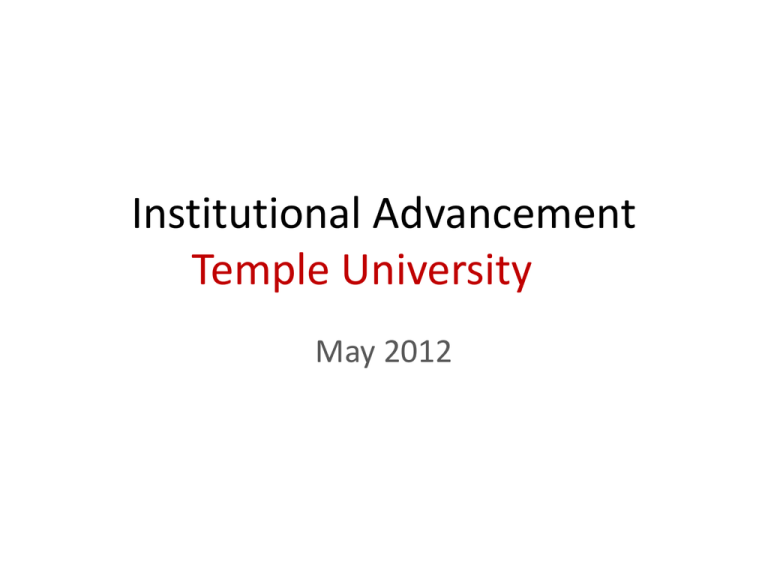
Institutional Advancement Temple University May 2012 Institutional Advancement The Office of Institutional Advancement The Office of Institutional Advancement serves Temple University through Alumni Relations, Major Gifts, Annual and Planned Giving, Corporate & Foundation Relations, Communications and other Development Support Services. Advancement Office staff work collaboratively with other Temple staff and faculty to build relationships among Temple’s alumni and friends. Through these contacts the Advancement Office secures the partnerships necessary to ensure the future success of Temple University. Key Areas: • Alumni Relations • Major Gifts • Planned Giving • Annual Giving • Corporations and Foundations Relations • Stewardship • Prospect Management • Operations • Communications and Marketing Why Fundraise? There are four primary sources of revenue for the University: • Tuition • State Appropriations • Sponsored Research and Tech Transfer • Contributions/Private support – FY12: $57 million goal – FY13: $70 million goal – FY20: $100 million goal The Future of Temple Core Values • • • • • • • Access to excellence and opportunities for success for all students Creation and application of knowledge Excellence in teaching and wide-reaching assessment of learning Ethical, social and community responsibility Cultural and global awareness Investigation, innovation and entrepreneurship Commitment to sustainability (from the Temple University Academic Strategic Compass: Executive Summary) The Future of Temple Target Points for Success • Recruit students of promise, including high school graduates and transfers, graduate and non-traditional students while sustaining Temple's hallmark diversity • Improve retention and graduation rates of undergraduates through more personalized academic advising and mentoring • Promote excellence in teaching • Utilize assessment to improve curriculum and pedagogy • Seek young scholars and artists in their respective fields, particularly where extramural funding is available, to replace retiring faculty (Temple University Academic Strategic Compass: Executive Summary) The Future of Temple Target Points for Success continued: • Achieve Very High Research Activity through substantial investment in the research infrastructure. • Encourage increased externally sponsored research • Increase numbers of international students and faculty and expand opportunities for Temple students and faculty to study and conduct research abroad • Expand the number of artistic and creative performances and exhibitions on campus; increase attendance at these events • Make Temple a destination for students, alumni, faculty, staff, the community and visitors from around the world Areas for Support Students Temple provides talented students of every background with access to an excellent education. To make this education affordable, we offer both need-based and merit-based financial aid, scholarships for study abroad and independent projects and opportunities for unique externships. Facilities Today more than 12,000 students live on and around Temple's Main Campus, creating a vibrant residential community. We provide these students with superb facilities, such as new buildings for the Fox School of Business and the School of Medicine, a Main Campus home for the Tyler School of Art, an addition to Presser Hall, renovation of the Temple Performing Arts Center (formerly the Baptist Temple) and many other improvements across campus. Faculty Temple professors continue to distinguish themselves through their commitment to teaching, inspiring students with their knowledge and dedication, in the classroom and beyond. This is true of senior faculty members who have taught at Temple for decades, and of the new scholars who have joined us from top universities nationwide. Research As Temple strives to provide its students with an enriching and challenging experience, research plays a critical role. A thriving program attracts top faculty and generates new learning opportunities. Temple students now have unprecedented opportunities to join faculty in original research and creative projects. Community Temple is an integral part of North Philadelphia, the Delaware Valley and the global community. We develop programs of study, establish research centers, forge partnerships and launch outreach efforts all responding to current needs in our community and in society. In return, life and learning at Temple are immensely enriched by our connections with the world beyond our campuses. Financial Summary From Fiscal Year 2011 Annual Report Temple University/Temple University Health System Fiscal Year 2011 – Including Educational Support Services and Consolidating Eliminations (in millions of dollars, rounded) Revenues Total: $2,220.04 $79.61 $40.58 $41.5 Patient Care Activities $42.53 Tuition and Fees $143.73 Commonwealth of Pennsylvania appropriation $164.97 Federal Grants and Contracts $1,129.5 $577.62 Contributions for Operations and Endowments Investment Return Auxiliary Enterprises Other Sources Financial Summary From Fiscal Year 2011 Annual Report Total Philanthropic Support Fiscal Years 2001-2011 TOTAL DOLLARS TOTAL DONORS In millions of dollars In thousands 70 60 $62 $65 60 $49 50 $49 $45 $44 40 $52 50 $48 $26 20 30 46.6 47.1 45.8 28.8 27.4 20 10 10 0 0 2001 2002 2003 2004 2005 2006 2007 2008 2009 2010 2011 48.2 48.1 40 $36 $33 30 43.7 45.0 45.8 47.0 2001 2002 2003 2004 2005 2006 2007 2008 2009 2010 2011 Who Supports Temple? • Temple Community is comprised of… – – – – – – – – – Alumni Students Parents Friends Faculty and Staff Trustees Corporations Foundations Government support What is a Gift? • Cash, stock, or other assets • Can be made once or in installments • Gifts can be pledged and paid off over a number of months or years • Restricted = donor decides where to allocate the money • Unrestricted = Temple decides where to allocate the money • Individual donors can often have their gift matched by their employer – “matching gifts” Solicitation Lifecycle Solicit Identify Cultivate Steward Length of time spent cultivating a donor often is dependent on the size of gift; generally, the larger the gift (e.g., a Leadership Gift), the longer the lifecycle. Nicole Naumoff AVP Advancement Comms Central Development Support Team Corporate and Foundation Relations, Annual Fund, Individual Gifts, Gift Planning Kate Moore Director of Corporation and Foundation Relations Nicole Steiner Executive Director of Annual Fund Kate Long Director of Individual Gifts Katharine Wiseman Individual Gift Officer Monica Gagliardi Individual Gift Officer Annual Fund Gifts made on a recurring, annual basis (July 1- June 30). Short solicitation cycle. • Focus: Gifts of $999 and under. Primary goal is participation, not dollar amount. “Bodies in the door”. • Audiences: Alumni, Parents, Friends, Faculty/Staff, Students (Tfund) • Channels: print, phone, e-mail, online • Recognition Society: Loyal T Society (recognizes consecutive giving) • Team: Nicole Steiner, Ivy Lane, Tammy Rodriguez, Alysea McDonald Individual Gifts Gifts made on a recurring, annual basis (July 1- June 30). Short solicitation cycle. • Focus: Gifts of $1k - $50k (an extension of the Annual Fund) Primary goal is increasing revenue and uncovering future Leadership Gift prospects. • Audiences: Alumni, Parents, Friends, Faculty/Staff • Channels: print, phone, e-mail, online, in-person • Recognition Society: Conwell Society (recognizes donors who invest $1k and above) • Team: Kate Long, Monica Gagliardi, Katharine Wiseman Leadership Gifts “Gifts of a lifetime”; gifts made once to Temple. Longer solicitation cycle; provide immediate support to Temple. Gifts are very specific and tailored to donor interest/need. • • • • Focus: Gifts of $50k - $999k Audiences: Alumni, Friends, Parents Channels: in-person Recognition Society: Conwell Society (recognizes donors who invest $1k and above) • Team: Central: Ashley Lomery, Melissa, Kapustin, Star Hamilton ; Units: Directors of Development and related unit staff. Gift Planning Structured gifts made to Temple with the dual purpose of maximizing the value of the donor’s gift to Temple as well as the donor’s personal financial goals. Gifts are highly sophisticated and require adequate level of expertise. • Focus: Gifts range from $5k to multi-millions • Audiences: Alumni, Friends, Faculty, Staff; often older segments • Recognition Society: Acres of Diamonds (recognizes donors who have made a planned gift) • Team: Meaghan Hogan Corporate and Foundation Relations The Office of Corporate and Foundation Relations (CFR) fosters external relationships with local, regional, and national corporations and foundations in order to build financial support for Temple University, and sustains internal relationships across Institutional Advancement and the entire university to align Temple initiatives with funding organizations. • Focus: Gifts range from $25k to multi-millions • Audiences: Corporations, Corporate Foundations, Private Foundations and other business entities. • Team: Kate Moore, Tara Miller, Susan Waskey and Kristy Goldy Corporations & Foundations Relations Responsibilities • Soliciting corporate and foundation support for Temple priorities as designated by University Leadership, including student support, faculty support, innovative programming, and capital improvements • Increasing the attention and value placed on Temple University as an investment, partner, collaborator, and community participant by the philanthropic community • Identifying cross-campus and interdisciplinary opportunities to strategically engage corporations and foundations in holistic partnerships with Temple • Guiding, strengthening, and growing relationships with prospect organizations and maintaining cognizance of their current funding priorities • Gaining insight into the programs and priorities within the schools and colleges, and aiding in identification and solicitation of potential corporate and foundation prospects for those priorities • Coordinating with the various offices of the Provost regarding mutual or related goals with Institutional Advancement (Office of Research, Student Services, Admissions etc.) Corporations and Foundations Staff Kate Moore, Director Tara Miller, Associate Director •Temple Athletics •Beasley School of Law •Boyer College of Music and Dance •School of Communications and Theater •College of Education •College of Liberal Arts •School of Environmental Design (Ambler Campus) •Fox School of Business and Management •Tyler School of Art •Libraries •Office of Student Affairs Susan Waskey, Assistant Director •Kornberg School of Dentistry •College of Engineering •College of Health Professions and Social Work •College of Medicine •Temple Health System •School of Pharmacy Kristy Goldy, Development Associate •School of Podiatric Medicine •College of Science and Technology •Inside-Out Prison Exchange Program (in CLA) •Prime Movers (in SCT) •Office of Research
